What are fatty acids? Find all the answers to all your questions surrounding omega fatty acids from what they are, why we need them, where to find them, and more! Plus, find tasty and nourishing recipes to include omegas in your diet with ease!
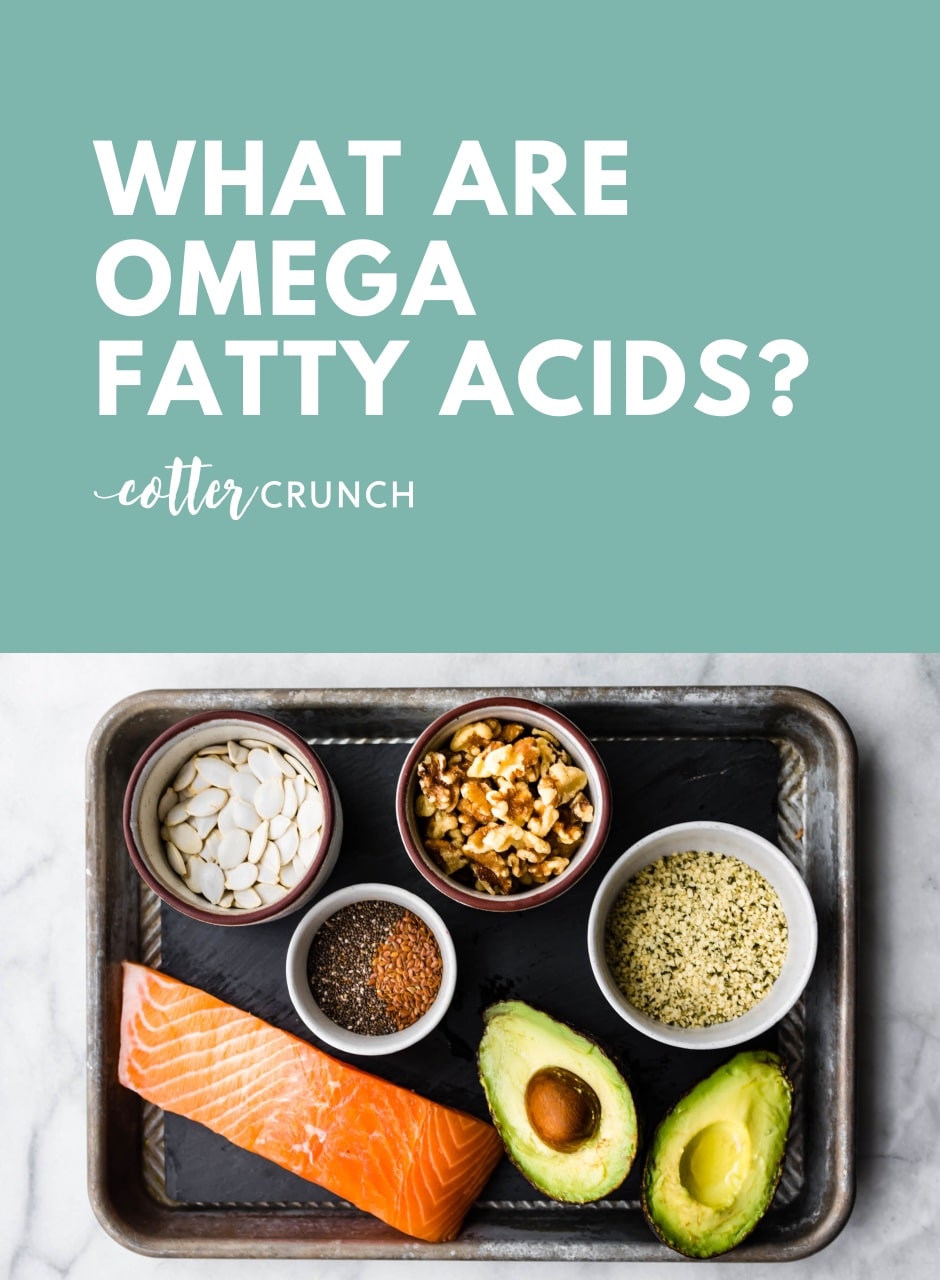
Part 1 of our full week of omega-rich recipes, this guide to answering, “What are omega fatty acids?” is part of our Restorative Health Series, meaning each recipe featured is made with nutrient-dense ingredients to help nourish your body!
Get ready for some nerdy nutrition, because we’re diving deep into the world of OMEGAS!! You ready?
Disclosure: Lindsay Cotter is a certified nutrition specialist, and does not have a medical degree. The information in this post comes from reliable medical resources, but should not be taken as medical advice. We recommend that you consult with your doctor before starting any new eating program or making changes to your diet.
Friendly Fats
Contrary to what the fad diets in the 90s led us to believe, fats are incredibly beneficial for our health and crucial to include in our diets for energy, proper cell function, nutrient absorption, and more. Plus, they’re pretty tasty! After all, who can turn down Chocolate Almond Butter Breakfast Cookies, Spiced Pumpkin Seed Granola, or Chocolate Avocado Mousse? Not me, that’s for sure! However, not all fats are created equal, and when it comes to your health, Omega fatty acids stand out from the rest. Unfortunately, there has been some confusion about which forms are beneficial and which may be harmful to health.
As a result, fatty acids of all kinds are often neglected in our diets, resulting in fatigue, dry skin, depression, and other unfavorable conditions. This being said, I know understanding omega fatty acids can be a bit difficult. So, to clear up any confusion, I decided to break everything from what they are, which are beneficial, why we need them, and what foods contain them below! Keep reading to find everything you need to know.
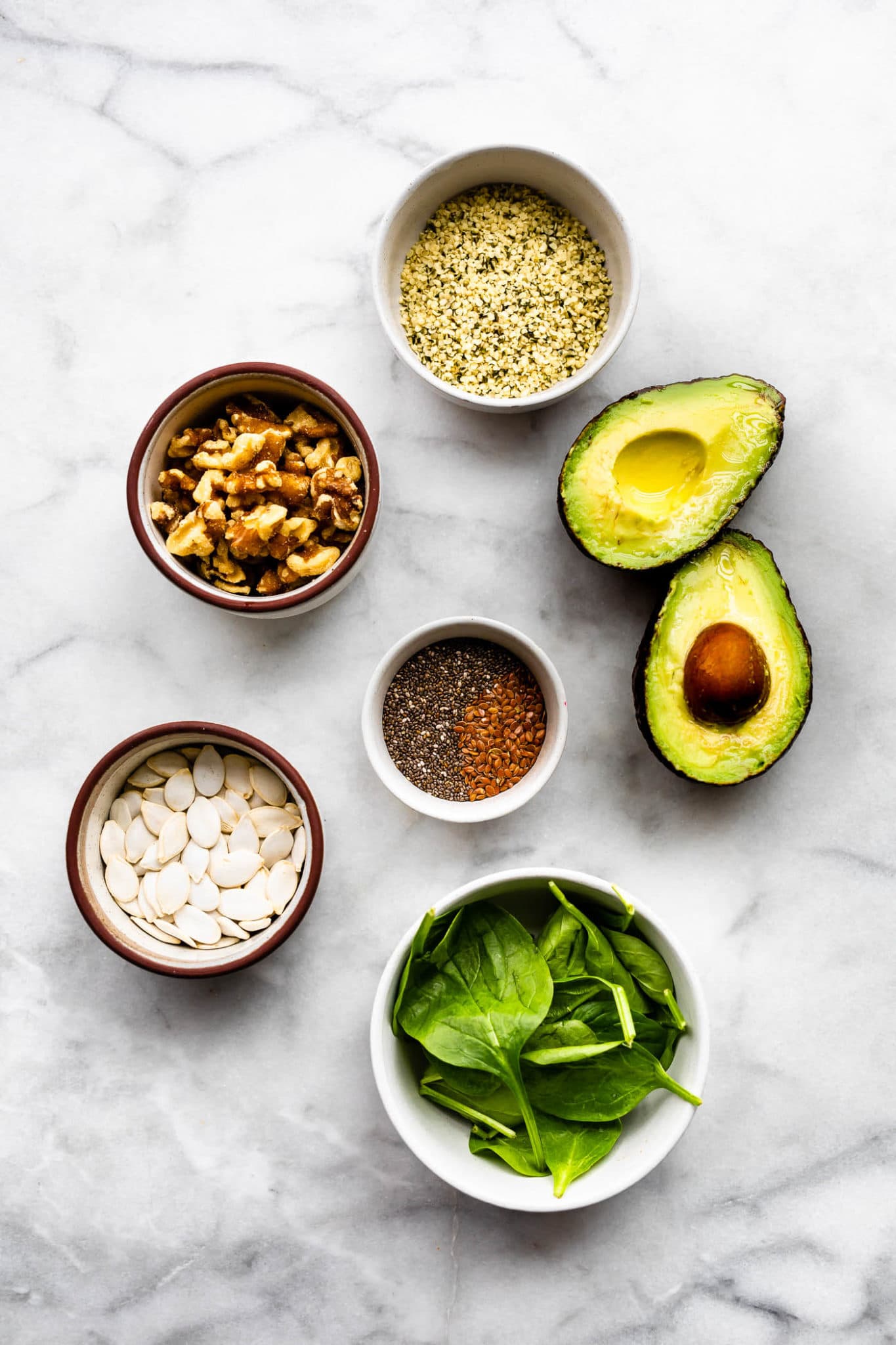
What Are Omega Fatty Acids?
Before we begin, it’s important to know that there are 3 forms of omega fatty acids including Omega-3, Omega-6, and Omega-9. Omega-3 and Omega-6 fatty acids are classified as polyunsaturated fatty acids, and Omega-9 fatty acids are classified as being monounsaturated fatty acids. At their molecular base, fatty acids are characterized by a long string of carbon atoms. However, polyunsaturated and monounsaturated fats are differentiated from saturated fats by the presence of a double bond in their strings of carbon atoms. When fats have just 1 of these double bonds, they are considered to be monounsaturated fatty acids. However, fats that contain 2 or more of these double bonds are considered to be polyunsaturated fatty acids. (Source)
Omega-3 Fatty Acids (The Nerdy Nutrition)
Considered to be essential fatty acids, Omega-3’s are a type of polyunsaturated fats that exist in 3 forms including DHA, EPA, and ALA. Our bodies can’t produce these fats themselves, but they are crucial for our health. As a result, they are considered “essential” fats and must be consumed in our diets.
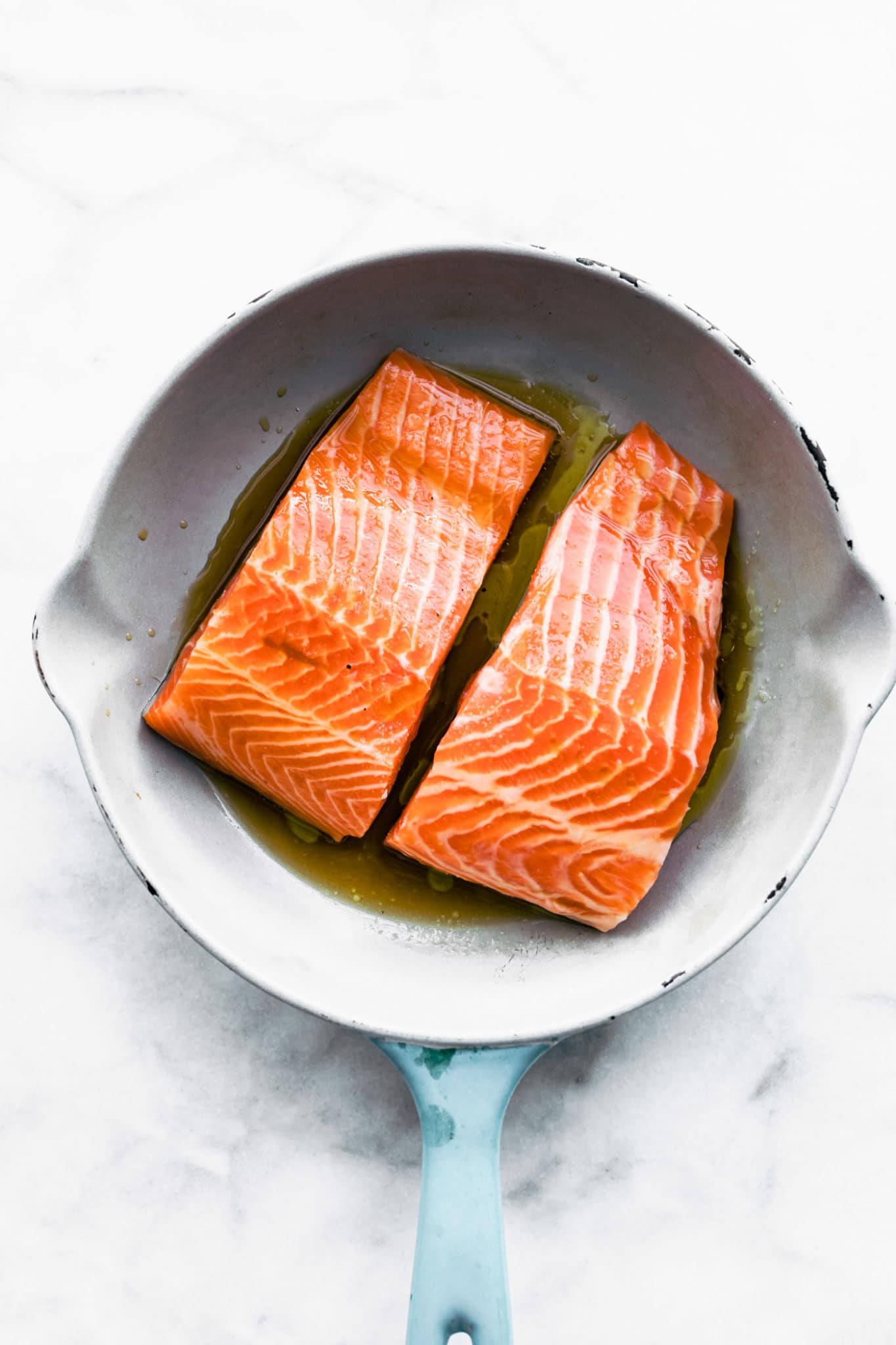
- ALA (alpha linoleic acid) – An 18-carbon fatty acid that can be converted into DHA and EPA
- DHA (docosahexanoic acid) – A 22-carbon fatty acid primarily found in the brain
- EPA (eicosapentaenoic acid) – A 20-carbon fatty acid that is converted to hormone-like compounds known as eicosanoids (Source)
Omega-6 Fatty Acids (The Good and the Bad)
Like Omega-3 fatty acids, Omega-6 fatty acids are also a form of polyunsaturated fats that must be consumed in our diets. The most common form of Omega-6 is known as linoleic acid (LA) which plays a role in energy and immune system functions. However, it also exists in a form known as arachidonic acid (AA). Upon consumption, LA is converted into AA which is then converted by the body into eicosanoids.
Note: It is important to know that there are some not-so-great sources of Omega-6 fatty acids such as refined seed oils that can actually cause inflammation. (Source)
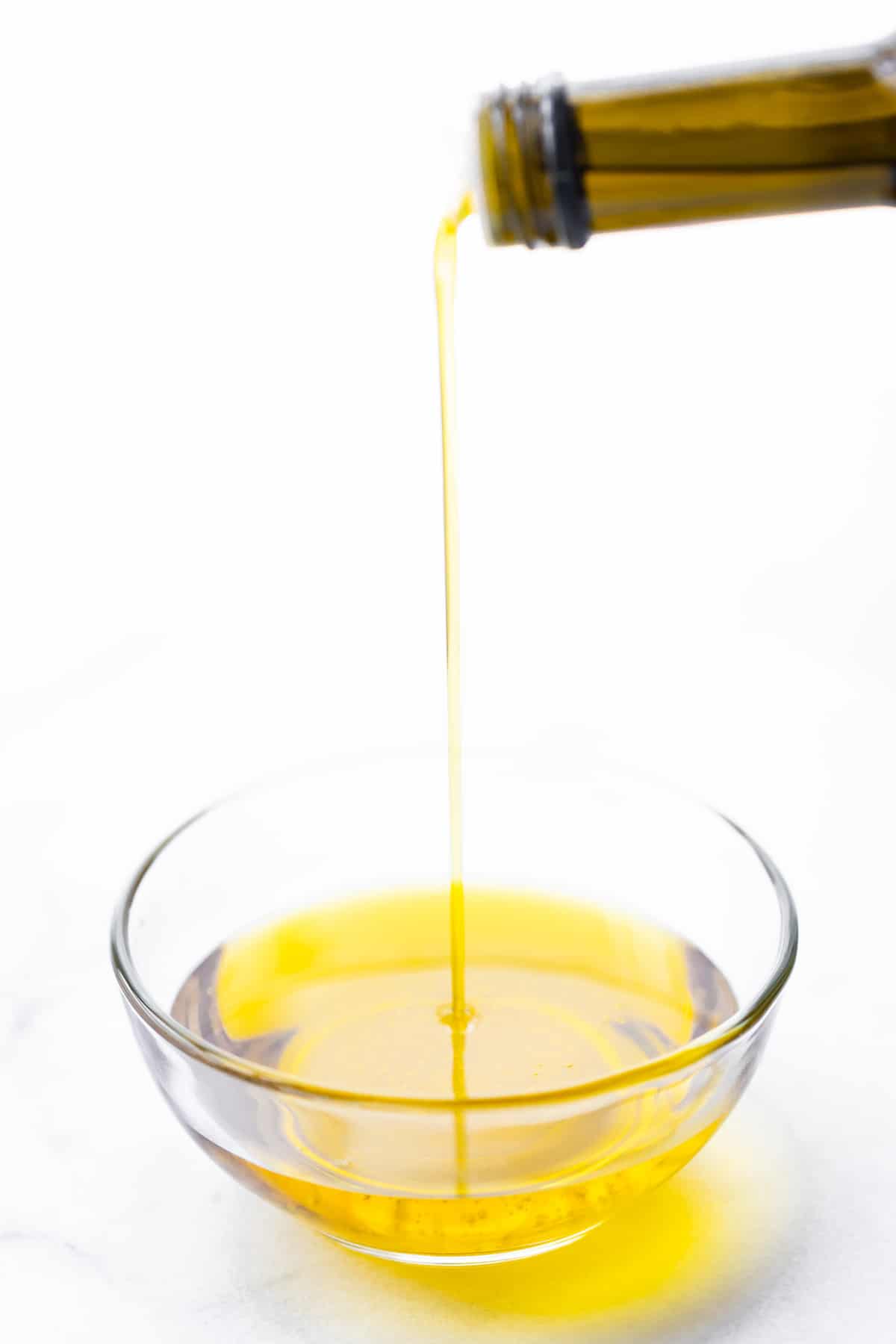
What are eicosanoids?
Without getting into the science too much, eicosanoids are signaling molecules in the body. Their role in the body depends on whether they come from Omega-3 fatty acids or Omega-6 fatty acids.
- Eicosanoids Derived from Omega-3 help reduce inflammation, protect against heart attack, strokes, and inflammatory diseases such as Lupus, arthritis, and asthma.
- Eicosanoids Derived from Omega-6 increase the inflammatory response to injury, stress, infection, and disease. This results in the ability to form blood clots and reduce bleeding. (Source)
Omega-9 Fatty Acids
Unlike Omega-3 and Omega-6 fatty acids, Omega-9 fatty acids are monounsaturated fats and aren’t considered to be essential, because the body can make them on its own. However, recent studies might disagree! (See our note below.) That certainly doesn’t mean that consuming them isn’t good for you, though!
Did You Know: Recent studies such as a trial published in the American Journal of Clinical Nutrition (source) have shown that the consumption of Omega-9 fatty acids found in oleic acid, could help increase the body’s energy levels, enhance mood, and decrease anger.
So, if you find yourself feeling tired and irritable… (guilty here), go make an Omega-9 rich snack such as an avocado salad wrap, or snack on raw almonds, and see how you feel!
Health Benefits of Omega Fatty Acids
As a whole, the benefits of omega fatty acids include improved mental health, improved heart health, a decrease in liver fat, supported brain development, improved eye health, reduced inflammation, and more. However, each form of omegas provides a slightly different benefit to the body. Take a look below to learn what each does!
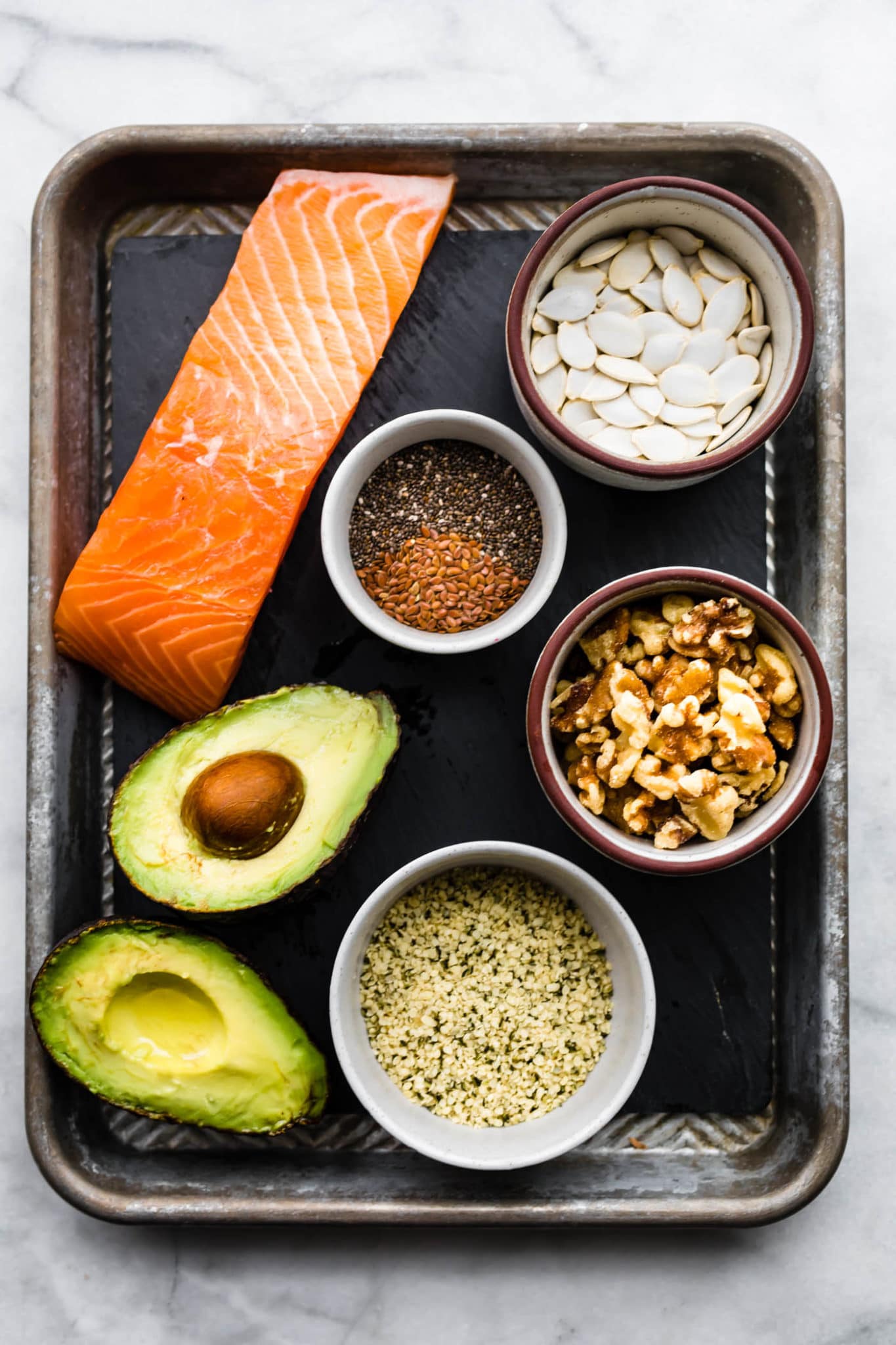
Omega-3
The benefits of Omega-3 fatty acids depend on which form is being consumed.
- LA – Improves heart health, the immune system, and nerve function
- DHA – Helps improve brain function and supports the development
Note: DHA makes up about 8% of the weight of your brain! (Source)
- EPA – Improves symptoms of depression and produces eicosanoids which help reduce inflammation
Omega-6
Although somewhat controversial, studies have shown that the consumption of Omega-6 fatty acids can help reduce the risk of heart disease, stroke, and decrease inflammation. However, in order to reap these beneficial properties, it is important to consume the right types of Omega-6 foods. To do so, opt for nuts and seeds in replace of vegetable oils, and take a look at the recommended food sources below. (Source)
Omega-9
Consuming Omega-9 fatty acids can help reduce the risk of cardiovascular disease, improve insulin resistance, prevent cancer, and improve symptoms of ADHD. (Source)
*Personal note: This made me realize that I definitely need more Omega-9 in my life!
Food Sources
Contrary to what many may believe, there are many sources of omega fatty acids you can include in your diet.
Nutrition Tip: You don’t have to just eat fish! Take a look below at some of the best food sources of omegas.
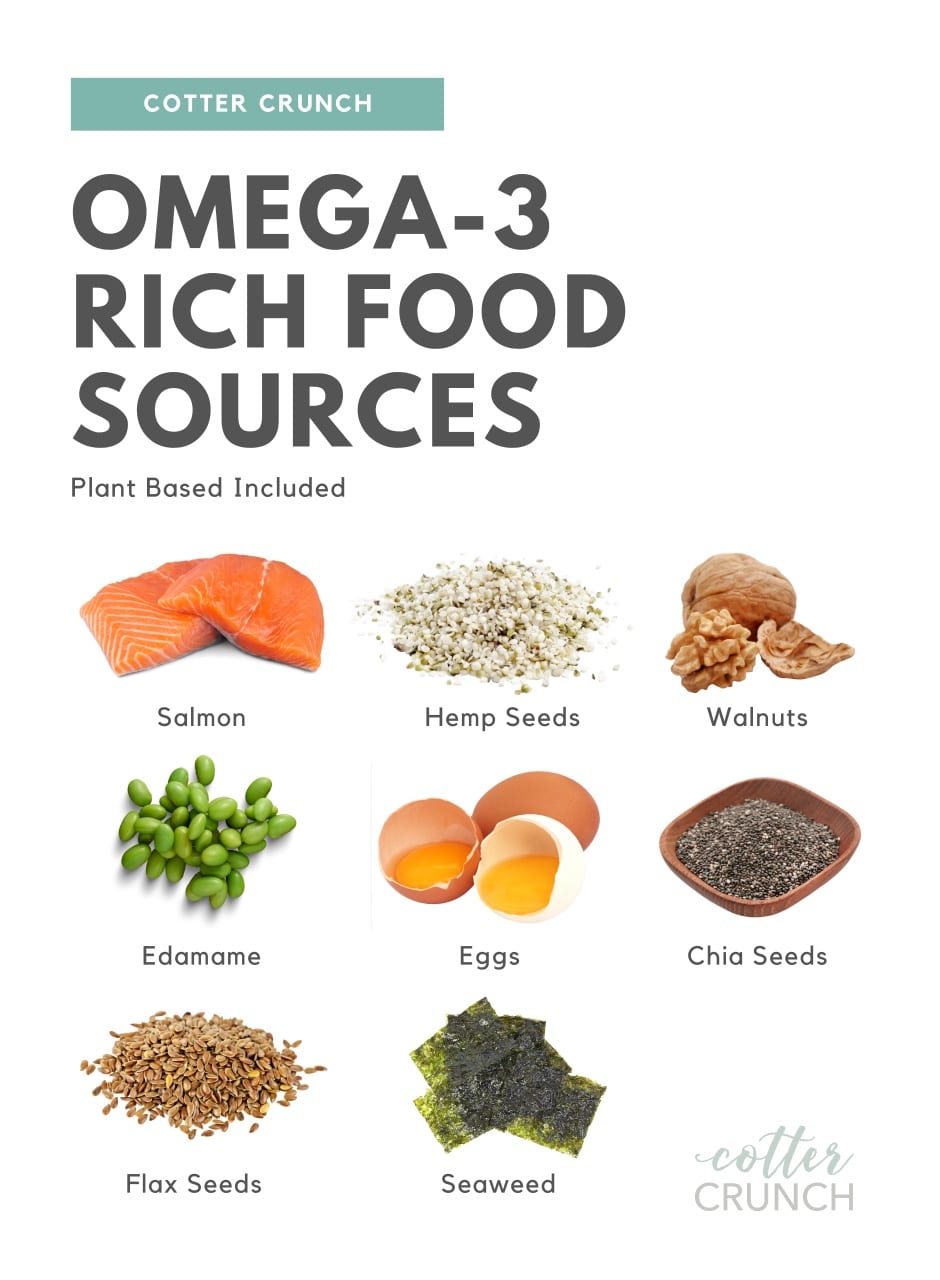
Omega-3:
Mackerel, salmon, herring, oysters, sardines, anchovies, caviar, flax seeds, chia seeds, English walnuts, spinach, kidney beans, hemp seeds, soybeans (such as edamame).
Omega-6
Walnuts, sunflower seeds, peanut butter, avocado oil, eggs, almonds, cashews
Sources to avoid: processed vegetable oils such as soybean oil, safflower oil, canola oil, and peanut oil.
Omega-9
Olive oil, avocado oil, almonds, cashews, walnuts
Common Questions
As with many health-related questions, the answer to this question varies from person to person. However, in general, it is not necessary to supplement your diet with Omega fatty acids as long as you are including a wide variety of omega-rich foods. That being said, it is important to get various sources of omegas from plants and fish. So, for those who do not regularly consume them, it may be a good idea to supplement with an algae-based omega. Of course, if you have a specific concern, be sure to consult your doctor before making any dietary changes!
In general, yes. In fact, some studies have shown that those who follow plant-based diets actually have a higher intake of Omega-3 fatty acids than those who don’t, thanks to their high intake of chia seeds, nuts, seeds, and other Omega-3 containing plant-based foods. (Source)
The easiest way to tell whether or not you are using a high-quality omega supplement is to take a look at the freshness and purity of the brand being used. The best omegas are obtained through healthy waters, processed in order to remove any contaminants, and third-party tested to ensure that the quality provided meets international standards. Read more here!
*Personal Note: I like to alternate between fish-based omega supplements (which I get through Binto) and plant based algae supplements.
Nutrition Tip: For optimal health, it is best to consume more Omega-3 than Omega-6 fatty acids. (Source)
Easy Ways to Include Omega-3’s In Your Diet
If you’re trying to include more omegas in your diet, there are easy ways to include them in foods you already eat! Take a look below to find some of my favorite ways to add omegas to my everyday meals.
- Add flaxseeds to smoothies, oatmeal, yogurt, and replace eggs with flax eggs in recipes like Sweet Potato Waffles
- Add walnuts to yogurt, salads, baked goods, or sauces
- Swap out regular products such as eggs and milk for omega-enriched options
- Add spinach to smoothies, salads, omelets, and stir-frys
- Include fish in your dinner with recipes like Superfood Baked Salmon or Tuna Zoodle Casserole!
Sample Week of Eating Omega-Rich Foods
Looking for more omega-rich recipes? Don’t worry! We’ve done the work for you and created a full day’s worth of easy-to-make recipes that are packed full of omega-3’s! Take a look below to find your favorites, or make them all.
Breakfast: – Overnight Matcha Chia Smoothie (or our Noatmeal!)
Lunch: Spicy Shrimp Caesar Spinach Salad Plant Based Mushroom
Snack: Crockpot Chunky Monkey Paleo Trail Mix or Plant Based Edamame Dip
Dinner: Maple Bourbon Glazed Salmon or kid friendly Tuna Noodle Casserole
Hopefully, that helped clear up some confusion regarding omega fatty acids! However, if you have any additional questions, please feel free to leave them down in the comments below. We’re always happy to help!
Cheers,
LC
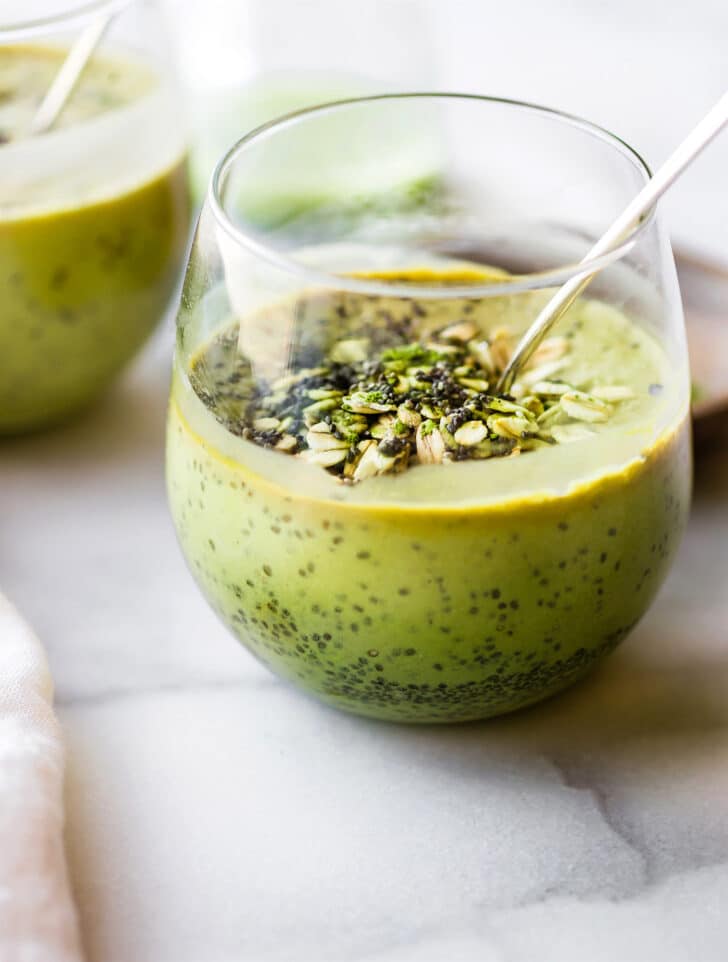
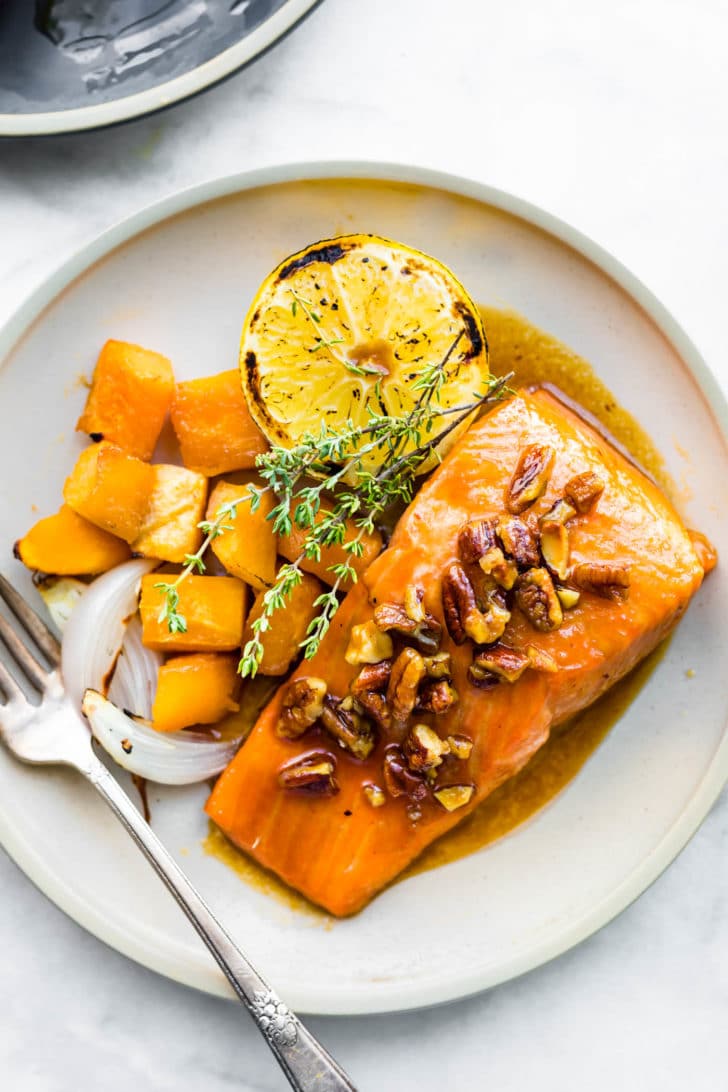
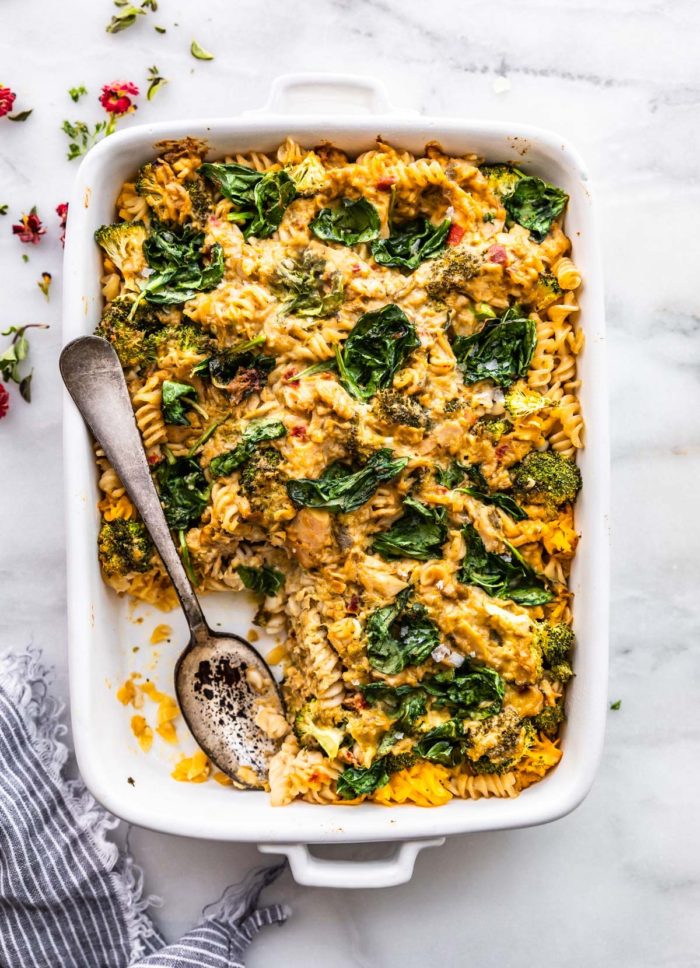
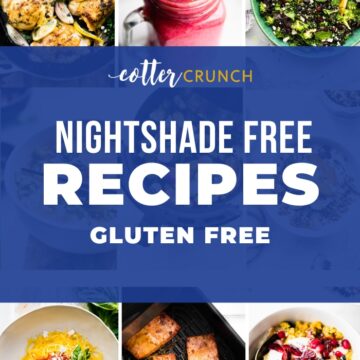
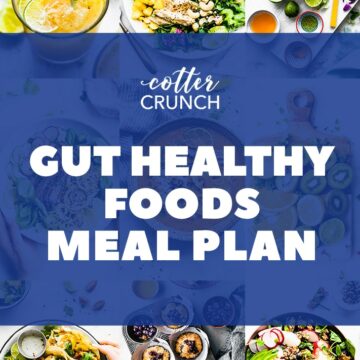
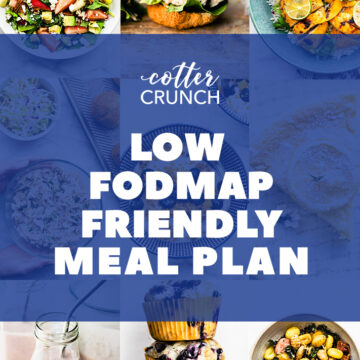
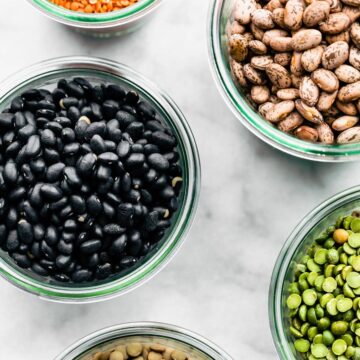

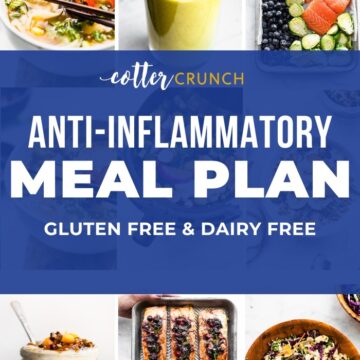
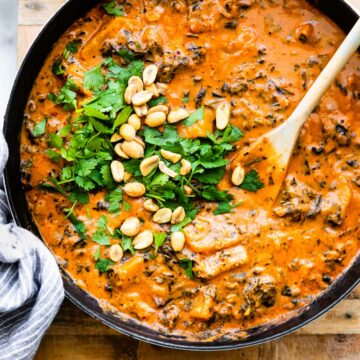
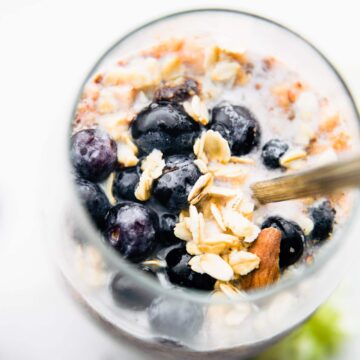
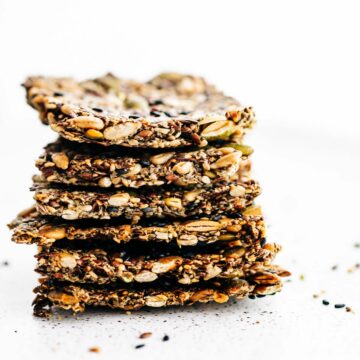
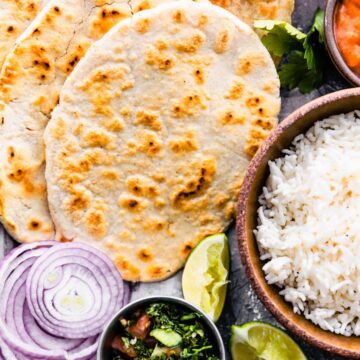
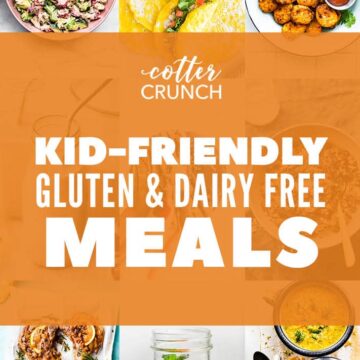
Rate & Comment